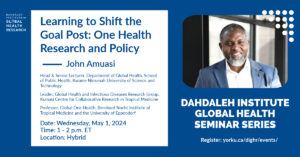Post
Published on July 30, 2024

On May 1, 2024, Dr. John Amuasi (Kwame Nkrumah University of Science and Technology) delivered a seminar emphasizing the necessity of adapting goals within the One Health framework. Dr. Amuasi addressed the traditionally negative perceptions of shifting goalposts that are often seen as preventing positive outcomes, particularly evident during the COVID-19 pandemic. However, shifting goalposts can be crucial for scientific progress and public health. He provided a historical context by referencing Hippocrates' humoral theory, linking health to the balance of bodily fluids, and Ignaz Semmelweis' advocacy for handwashing to prevent puerperal fever. Both examples show that shifting goalposts are essential because scientific knowledge is dynamic and constantly evolving, requiring updates to maintain relevance and effectiveness.
Through exploring the complexity of One Health systems, which integrate human, animal, and environmental health, Dr. Amuasi argued that the dynamic nature of these systems necessitates shifting goalposts. He illustrated examples from recent clinical studies, where adaptive platform trials required changes in sample sizes and protocols to remain effective and relevant. In a complex and interconnected world, health interventions must be flexible and responsive to new data and changing conditions.

The seminar included a case study on anti-malarial drugs, demonstrating how health system factors influence treatment effectiveness in different regions. Dr. Amuasi emphasized health system factors, such as local practices and infrastructure, significantly impact treatment outcomes. This case study underscored the need for localized strategies and continuous adaptation to achieve optimal health outcomes. He stressed that recognizing and managing these trade-offs is essential for effective public health policy.
Dr. Amuasi concluded with a call for continuous improvement and adaptation in One Health, discussing that shifting goalposts based on evolving scientific knowledge is crucial for achieving sustainable health outcomes. This dynamic approach is essential for addressing the complex challenges faced by One Health and integrating new scientific insights into practice. The seminar underscored the importance of flexibility and a willingness to adapt in the pursuit of improved global health outcomes.
Watch the seminar presentation below:
Connect with Dr. John Amuasi
Themes | Global Health Foresighting |
Status | Active |
Related Work |
N/A
|
Updates |
N/A
|
People |
N/A
|
You may also be interested in...
Updates – New Website for the 2023 World Health Assembly Simulation at York University
The World Health Assembly Simulation (WHA SIM), led by Dahdaleh faculty fellow, Dr. Ahmad Firas Khalid, announces a new website in preparation for the upcoming Global Health WHA SIM, taking place from April 30 to ...Read more about this Post
Recap — Agent-Based Modelling of the Impacts of Climate Change
On October 5, Dahdaleh postdoctoral research fellow Mohammadali Tofighi introduced computer modelling approaches and applications for modelling health impacts caused by climate change in Malawi. The modelling process can be abstract. Mohammadali discussed a few ...Read more about this Post
Recap — Pandemic Urbanism: Looking at Past Infectious Diseases and Preparing for a Post-Pandemic World
On March 8, over 35 participants attended the launch of Pandemic Urbanism: Infectious Diseases on a Planet of Cities (Polity Press, 2022), co-authored by S.Harris Ali, Creighton Connolly and Roger Keil. Prof. Syed Harris Ali ...Read more about this Post
